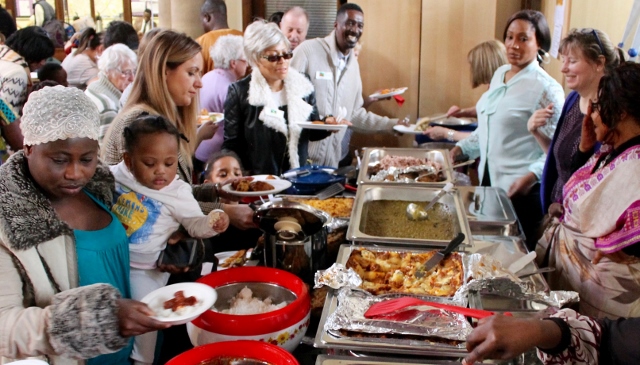 St Luke's Holbeck has a remarkably multinational congregation, and last Sunday, to both celebrate their diversity and mark their recent growth, they put on an international meal. Over 100 people came and sampled food from over a dozen nations.
St Luke's Holbeck has a remarkably multinational congregation, and last Sunday, to both celebrate their diversity and mark their recent growth, they put on an international meal. Over 100 people came and sampled food from over a dozen nations.
 Vicar, the Revd Alistair Kaye, says, “We’ve had a multinational congregation for some time, but recently we’ve welcomed around 15 new Ghanaian families, four Eastern European Families and a couple of families from countries in Asia. In fact now 40% of the congregation are originally from over seas. We have around 120 at our main Sunday service – with up to 50 children in the Sunday School, and baptisms have gone through the roof (as it were).”
Vicar, the Revd Alistair Kaye, says, “We’ve had a multinational congregation for some time, but recently we’ve welcomed around 15 new Ghanaian families, four Eastern European Families and a couple of families from countries in Asia. In fact now 40% of the congregation are originally from over seas. We have around 120 at our main Sunday service – with up to 50 children in the Sunday School, and baptisms have gone through the roof (as it were).”
 Is there a particular secret to their growth? Alistair says, "Well first we inherited a well lead congregation from my predecessor Chris Butler, and good links with a great church school have made things so much easier.
Is there a particular secret to their growth? Alistair says, "Well first we inherited a well lead congregation from my predecessor Chris Butler, and good links with a great church school have made things so much easier.
"One-to-one contact is always the most effective way of letting people know about us and we’ve put a lot of work into visiting people in the community. But, surprisingly, just changing ‘Church of England’ to ‘Anglican’ on the outside notice board has also meant that some understand better who we are (and also removes the barrier of any colonial associations), and they’ve started coming as a result.
“The different communities play a full part in the life of the church - we now have deputy church wardens who are Ghanaian and Nigerian, a Ghanaian choir who sometimes sing at Communion, and we’re even putting together an international cook book.
 “It’s good to see ourselves through the eyes of other cultures, and we like learning about each other. There’s a real buzz and energy around, but I think many think we’re still too restrained – some come from churches where ordinarily they’d been dancing down the aisle when they bring the offering!”
“It’s good to see ourselves through the eyes of other cultures, and we like learning about each other. There’s a real buzz and energy around, but I think many think we’re still too restrained – some come from churches where ordinarily they’d been dancing down the aisle when they bring the offering!”
St Luke’s has also recently delivered 1000 surveys asking residents what they think the community needs. Alistair says, “It will help us discern how we can best help meet local needs, and from the responses so far, it seems that work with children will be is a priority”.